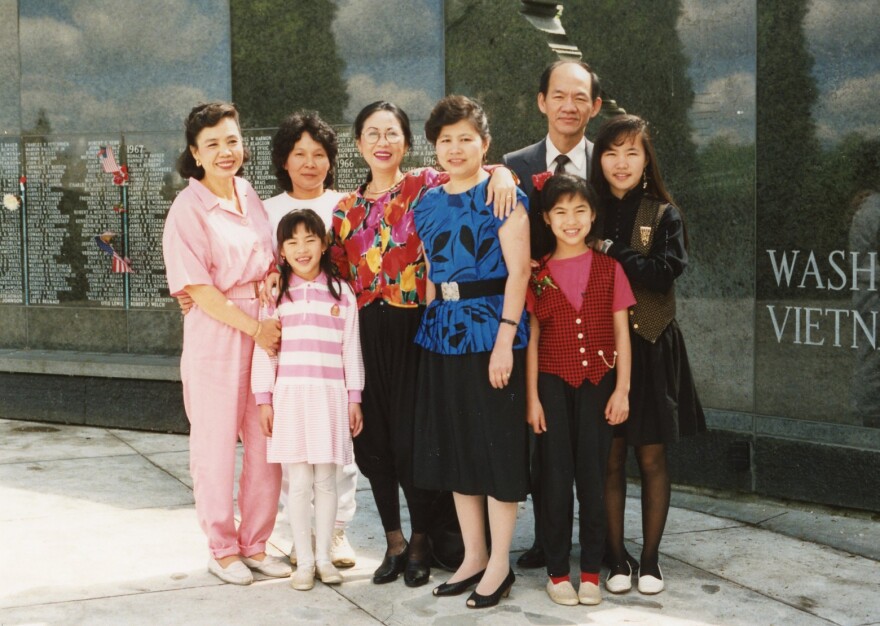The courtroom feels soulless. I remember unflattering fluorescent lights. The room is small enough that everyone can see each other. You can't hide.
Thanh Tan is the host of Second Wave, a new podcast debuting September 5. Subscribe now.
It’s similar to shows like Law & Order. There’s the judge’s bench at the front of the room. There’s a seal on the wall, a jury box to the side, and tables where the plaintiffs and defendants strategize ways to destroy one another.
As I breathe in the stale air and hear the bustle of people who clearly don’t want to be in court, I’m preparing to testify that my dad is not a Viet Cong agent, that in fact he is the opposite – the staunchest anti-communist I know.
[asset-images[{"caption": "Thanh's father, Duc Tan, holds the American flag and stands next to Dr. Dung Nguyen, president of the Vietnamese Community of Pierce County, at a political rally in this undated photo. Like most other refugees, they still prefer to recognize the flag of the former South Vietnam. The official flag of Vietnam is a sore subject and almost never seen at Vietnamese-American events. ", "fid": "138886", "style": "placed_wide", "uri": "public://201709/flags.jpg", "attribution": "Credit Courtesy of Thanh Tan"}]]
This was back in 2009.
For years, people had spread rumors that there were communist spies among us in Olympia, Washington. I’m not joking. This was serious stuff. If you were labeled a communist or even not anti-communist enough, fellow Vietnamese people stopped talking to you. You could be ostracized, discredited, and shamed into stepping away from community activities.
[asset-images[{"caption": "Thanh Tan's father Duc Tan (left) was a lieutenant in the South Vietnamese Army. After the war, like so many others, he was imprisoned in a communist re-education camp. He later escaped Vietnam by boat. Hear that story in a future episode of Second Wave.", "fid": "138892", "style": "offset_left", "uri": "public://201709/ductan.png", "attribution": "Credit Courtesy of Thanh Tan"}]]In that courtroom, I remember the pain of watching, one by one, people my dad’s age take the stand, point at him and insist that he’s a communist infiltrating our hometown of Olympia.
It becomes clear they know nothing about him–that he was drafted into the military after the Tet Offensive of 1968 and became a lieutenant in the South Vietnamese Army. That his brother was murdered by the communists for being an officer siding with the American cause. That after the war he, along with countless other South Vietnamese men of his generation, was imprisoned in a communist re-education camp. That he escaped Vietnam with my mother and sister on a boat, that he has been here ever since.
The evidence against him? Santa Claus. Well an apron with Santa Claus on it. I’ll explain that later. (Subscribeto ensure you don't miss that episode.)
The point is: These people my dad found himself suing for defamation in court had been out to smear his reputation and to downplay everything he’d worked for in America. They tried to deport him. He even received a death threat that was never solved.
This whole episode marked the first time I realized my family has enemies. The Vietnam War may be over but it is still being felt within the Vietnamese-American community.
In my new podcast Second Wave, produced with KUOW and PRX, I’ll explore this and other stories from our community. They are stories of heartbreak and triumph, born from a war that still lingers in all our lives four decades later.
Growing up in Olympia was quiet. All American. We visited parks. My parents worked for state government. I played soccer. Got elected to student government all four years of high school. Volunteered for the Red Cross. My Dad would always tell us, "This is the best time of your life. You're in America. You're safe."
The war always seemed so removed from me, and my parents shielded us from the details of what they'd seen.
But I did learn early on – while complaining about swim lessons at the YMCA – that they escaped Vietnam by boat in 1978, before I was born. For a long time, all I knew was it was a stormy night. The boat capsized. There were no life jackets. Some family friends on the boat didn't survive. That, my mom told us, is why we had to learn how to swim.
[asset-images[{"caption": "Thanh and her younger sister, Anh, stand in front of a political booth their father helped set up at a community event. Circa 1990.", "fid": "138888", "style": "placed_full", "uri": "public://201709/tansisters.JPG", "attribution": "Credit Courtesy of Thanh Tan"}]]Looking back on these moments, I realize that I wasn’t mature enough to comprehend my family’s incredibly unlikely and challenging journey to achieving the so-called American Dream.
I used to resent having to balance two cultures, two languages…two of everything. I’m just starting to appreciate how those dual identities have made me stronger…more resilient. And now I’m ready to tackle the full truth of what it means to be a second-generation child of refugees.
I hope you’ll follow me on this journey, this American story that begins in Vietnam.
Subscribe now. New episodes drop every other week, beginning September 5.

